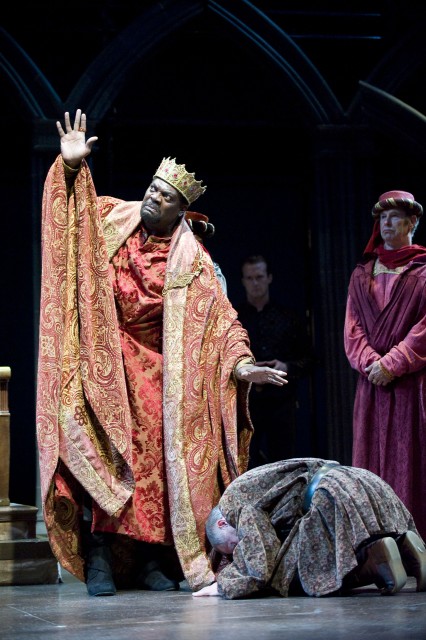Shakespeare & Company, the summer theater festival in Lenox, Massachusetts, has become one of my most eagerly awaited annual out-of-town reviewing stops. To see why, take a look at my drama column in today’s Wall Street Journal, in which I report on three of the company’s ten summer shows, a new play by Joan Ackermann called The Taster and a pair of Shakespeare productions, Richard III and The Winter’s Tale. Here’s an excerpt.
* * *
“The Taster” is one of those plays in which the members of the cast double as characters from the past and present. Tom O’Keefe and Maureen O’Flynn play Gregorio, a 16th-century Basque king, and his unhappy Queen Mariana (he longs to sire a son but has fallen out of love with his wife). They also play Henry and Claudia, a modern-day New York couple whose marriage is on the rocks (he’s a depressed ex-banker who is living off his wife’s modest income as an opera singer while attempting to translate a forgotten play about the plight of King Gregorio and Queen Mariana). Rocco Sisto is the title character, one of Gregorio’s food tasters–he specializes in the detection of slow-acting poisons–whom Mariana seduces in the hope of passing off their bastard child as the king’s heir.
If all this sounds impossibly tangled, don’t despair. Not only has Ms. Ackermann woven her two plots together so adroitly as to recall Jorge Luis Borges at his most virtuosic, but Tina Packer, the director, has staged “The Taster” with such scrupulous attentiveness to period detail that you always know where you are and what time (so to speak) it is. The dialogue blends quiet, uncloying lyricism (“The back of her neck smells like my childhood”) with comic flashes that crackle like summer lightning…
 John Douglas Thompson, who took New York by storm last year in the Irish Repertory Theatre’s revival of “The Emperor Jones,” is very much the star of “Richard III,” in which he gives yet another timber-shivering performance as the hunchbacked beast who’ll kill anyone, up to and including his brother and his wife, in order to set England’s crown upon his head. Mr. Thompson’s pellucid diction is a known quantity among American connoisseurs of classical acting–he makes every syllable shine–but even those who have seen his Othello will be impressed anew by the individuality with which he makes manifest the monstrous urges of Shakespeare’s nastiest piece of work. What I liked best about his interpretation was its grisly humor…
John Douglas Thompson, who took New York by storm last year in the Irish Repertory Theatre’s revival of “The Emperor Jones,” is very much the star of “Richard III,” in which he gives yet another timber-shivering performance as the hunchbacked beast who’ll kill anyone, up to and including his brother and his wife, in order to set England’s crown upon his head. Mr. Thompson’s pellucid diction is a known quantity among American connoisseurs of classical acting–he makes every syllable shine–but even those who have seen his Othello will be impressed anew by the individuality with which he makes manifest the monstrous urges of Shakespeare’s nastiest piece of work. What I liked best about his interpretation was its grisly humor…
As for “The Winter’s Tale,” which appears to be well on the way to becoming the most frequently performed of Shakespeare’s less popular plays, Kevin G. Coleman’s wonderfully balanced staging makes each tricky change of mood feel as natural as the turning of a page. Jonathan Epstein, who plays the self-laceratingly jealous King Leontes, starts off in a low, intimate key, then unleashes his dark fury so persuasively that you almost want to look away from the stage….
* * *
Read the whole thing here.
Archives for 2010
TT: Almanac
“The truth is cruel, but it can be loved, and it makes free those who have loved it.”
George Santayana, “Ideal Immortality”
TT: Just because
Vladimir Horowitz plays Chopin’s B Minor Mazurka, Op. 33/4, in Vienna in 1987. This is a piece for which Horowitz had a special fondness–one that I share:
TT: So you want to see a show?
Here’s my list of recommended Broadway, off-Broadway, and out-of-town shows, updated weekly. In all cases, I gave these shows favorable reviews (if sometimes qualifiedly so) in The Wall Street Journal when they opened. For more information, click on the title.
Warning: Broadway shows marked with an asterisk were sold out, or nearly so, last week.
BROADWAY:
• La Cage aux Folles (musical, PG-13, adult subject matter, reviewed here)
• Fela! * (musical, PG-13, adult subject matter, reviewed here)
• Million Dollar Quartet (jukebox musical, G, reviewed here)
OFF BROADWAY:
• Alfred Hitchcock’s The 39 Steps (comedy, G, suitable for bright children, original Broadway production reviewed here)
• Avenue Q (musical, R, adult subject matter and one show-stopping scene of puppet-on-puppet sex, reviewed here)
• The Fantasticks (musical, G, suitable for children capable of enjoying a love story, reviewed here)
• Our Town (drama, G, suitable for mature children, closes Sept. 12, reviewed here)
IN ASHLAND, ORE.:
• Hamlet (Shakespeare, PG-13, closes Oct. 30, reviewed here)
• Ruined (drama, PG-13/R, violence and adult subject matter, closes Oct. 31, reviewed here)
• She Loves Me (musical, G, suitable for children capable of enjoying a love story, closes Oct. 30, reviewed here)
IN GARRISON, N.Y.:
• The Taming of the Shrew/Troilus and Cressida (Shakespeare, PG-13, playing in rotating repertory through Sept. 5, reviewed here)
IN SAN DIEGO:
• King Lear/The Madness of George III (drama, PG-13, playing in rotating repertory through Sept. 24, reviewed here)
CLOSING SOON IN SANTA CRUZ, CALIF.:
• The Lion in Wnter (serious comedy, PG-13, closes Aug. 29, reviewed here)
• Love’s Labour’s Lost (Shakespeare, PG-13, closes Aug. 29, reviewed here)
CLOSING NEXT WEEK ON BROADWAY:
• South Pacific * (musical, G/PG-13, some sexual content, brilliantly staged but unsuitable for viewers acutely allergic to preachiness, closes Aug. 22, reviewed here)
CLOSING SUNDAY IN GLENCOE, ILL.:
• A Streetcar Named Desire (drama, PG-13, adult subject matter, reviewed here)
CLOSING SUNDAY IN PETERBOROUGH, N.H.:
• Tartuffe (verse comedy, PG-13, adult subject matter, reviewed here)
TT: Almanac
“The truth. It is a beautiful and terrible thing, and should therefore be treated with great caution.”
J.K. Rowling, Harry Potter and the Philosopher’s Stone
TT: Come on and hear (cont’d)
Bryant Park, 12:30 today. Be there or be square:

TT: Snapshot
Erle Stanley Gardner, the creator of Perry Mason, appears as the mystery guest on a 1957 episode of What’s My Line?:
(This is the latest in a weekly series of arts-related videos that appear in this space each Wednesday.)
TT: Almanac
“Such is the irresistible nature of truth, that all it asks, and all it wants, is the liberty of appearing. The sun needs no inscription to distinguish him from darkness.”
Thomas Paine, The Rights of Man
